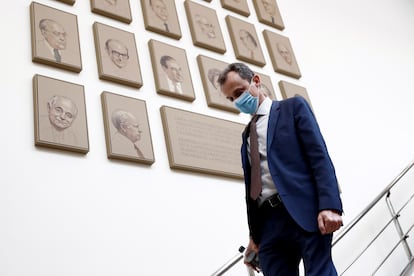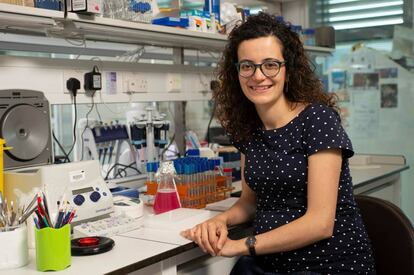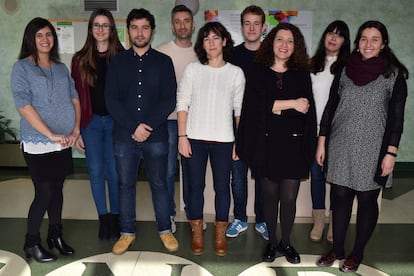Spanish scientists launch online protest to demand end to precarious working conditions
The virtual rally for less red tape and more funding gained support from students, research agencies and even Spain’s Science Minister Pedro Duque

One of the latest protests against the precarious situation of science in Spain was triggered by a 21-year-old student named Maria Cholvi.
The virtual rally took place on Wednesday of last week and gained support from students, research agencies and even Spain’s Science Minister Pedro Duque, all of whom promoted the hashtag #SinCienciaNoHayFuturo (#WithoutScienceThereIsNoFuture).
Spain currently spends less on science than it did in 2010
Based on that success, a new online protest took place this Wednesday to request more investment in science and better working conditions for researchers to stop the brain drain – two historical demands of the Spanish scientific community.
Spain currently spends 1.24% of its gross domestic product (GDP) on science, compared to Germany’s 3% and the European average of 2%. Spending levels today are lower than in 2010, when Spain was investing 1.40% of GDP. Yet the Spanish Science and Technology Strategy 2013-2020, approved under the previous administration of Mariano Rajoy, had set a spending goal of 2% of GDP.
The minority government of Pedro Sánchez, of the Socialist Party (PSOE), has not managed enough congressional support to get a new national budget passed, and Spain continues to function under the 2018 spending plan designed by Rajoy, of the conservative Popular Party (PP).
A call to action
The genesis for last week’s protest was a remark made on June 14 by the president of the Spanish Cancer Research Association, Xosé R. Bustelo. “We complain a lot on Twitter and over beers at conferences, but who protested over the non-existent budget? Who demanded a budget increase?” he asked the Spanish scientific community. “There’s a lot of anger, but very little action.”
Cholvi, a pharmacy student at Valencia University, decided to take up the challenge and tweeted the following message: “This needs to change! Let’s make them listen to us. Wednesday 17 [June] at 12pm, everyone: #SinCienciaNoHayFuturo.”
The message sparked an online protest that attracted everyone from young researchers working in precarious conditions to the Confederation of Scientific Societies of Spain (COSCE), an umbrella group for 82 associations. The Spanish National Research Council (CSIC), the country’s largest public agency devoted to science, also joined, as did the SOMMa alliance, which promotes excellence in scientific research.
Si queremos estar preparados para la España del mañana y aspirar a mejor formación, más empleo cualificado, mayor competitividad y un Estado de bienestar sostenible, debemos apostar por la educación, la ciencia y la innovación.
— Pedro Duque (@astro_duque) June 17, 2020
Es el único camino. #SinCienciaNoHayFuturo pic.twitter.com/GShxEEGSxj
Paradoxically, even Science Minister Pedro Duque joined the movement with the following message on Twitter: “If we want to be ready for the Spain of tomorrow and hope for better training, more qualified jobs, more competitiveness and a sustainable welfare state, we must support education, science and innovation. It is the only way. #SinCienciaNoHayFuturo.”
Precarious jobs
Now, some of the groups who participated in last week’s protest, including the Federation of Young Researchers (FJI/Precarios) and the Spanish Cancer Research Association (Aseica), have organized a fresh online rally that was a trending topic in Spain on Wednesday.
The social media action has attracted leading researchers such as Ana Cuenda, head of the Immunology and Oncology Group at the National Biotechnology Center in Madrid. Her team investigates cancer cells and inflammatory diseases, yet “we are 10 people and I am the only one with a permanent position. All the others have temporary contracts,” she said in her Twitter account. “I am not asking for the 10 of us to become public employees, but I do ask for some continuity. Right now I am forced to renew my group constantly.”

In Spain, many scientists find themselves signing a string of temporary contracts to perform permanent work. The lack of future prospects has made many young researchers pack their bags and seek work abroad. Marta Shahbazi, a 35-year-old researcher in regenerative medicine who has been heading her own group at Cambridge University for the the last four months, illustrates the situation.
“Spain trained me: six years at a public high school, a five-year college degree in biology, a master’s degree at Madrid Autonomous University, and a five-year PhD at the National Center of Cancer Research. Thanks to scholarships, I never paid for anything. And now that the time has come to repay the investment, I am doing it abroad,” she tweeted out during last week’s protest.
Stability
“We’re not demanding anything new,” adds Violeta Durán, a predoctoral researcher at the School of Medicine of Madrid’s Complutense University and the vice-president of FJI/Precarios. “Suddenly we are seeing that the people who were taking our funding away last year are now asking us for a solution to the [coronavirus] pandemic. We need more funding and a stable, well-defined research career.”
In February 2019, the Sánchez administration approved a package of urgent measures to eliminate the bureaucratic hurdles that have been further hampering laboratory work since 2014, when Rajoy placed a tax inspector at every public research agency and tasked them with monitoring every planned expense. Sánchez’s initiative also included measures to streamline hiring and achieve more staff stability.
Sources at the COSCE confederation said they are joining the protest because their years-long demands continue to be ignored. This body wants the State Research Agency, Spain’s main science funding agency, to be endowed with a long-term budget with stable and predictable funds year on year. Right now, thousands of research groups depend on funds that are theoretically released annually for a duration of three years, but which in practice are delayed for as much as six months due to red tape and disagreements between ministries. This leaves many labs without money, forcing them to fire workers. The Science Ministry has pledged to fix this situation starting next year.

“The government is fully aware of the problems facing science and innovation, two areas that have suffered from shrinking budgets and administrative hurdles for years,” said a spokesperson at the ministry. The government’s new measures include eliminating the “preliminary audit” by tax inspectors, as well as “increasing the resources for R&D [research and development] despite not having a new budget since 2018, besides the funds earmarked for Covid-19 research.”
In 2019, the public sector invested €3.36 billion in R&D, representing 51% of the available funds, according to government figures analyzed by the Cotec Foundation.
The Spanish Cancer Research Association (Aseica) also wants to see more streamlined bureaucracy, a “substantial increase” in funding, and for the government to spend 100% of the budget allocation for science.
Marisol Soengas, a member of Aseica and head of the Melanoma Group at the National Center for Cancer Research, would like to see a national pact for science that would make scientific research more independent from politics.
English version by Susana Urra.
Tu suscripción se está usando en otro dispositivo
¿Quieres añadir otro usuario a tu suscripción?
Si continúas leyendo en este dispositivo, no se podrá leer en el otro.
FlechaTu suscripción se está usando en otro dispositivo y solo puedes acceder a EL PAÍS desde un dispositivo a la vez.
Si quieres compartir tu cuenta, cambia tu suscripción a la modalidad Premium, así podrás añadir otro usuario. Cada uno accederá con su propia cuenta de email, lo que os permitirá personalizar vuestra experiencia en EL PAÍS.
¿Tienes una suscripción de empresa? Accede aquí para contratar más cuentas.
En el caso de no saber quién está usando tu cuenta, te recomendamos cambiar tu contraseña aquí.
Si decides continuar compartiendo tu cuenta, este mensaje se mostrará en tu dispositivo y en el de la otra persona que está usando tu cuenta de forma indefinida, afectando a tu experiencia de lectura. Puedes consultar aquí los términos y condiciones de la suscripción digital.









































